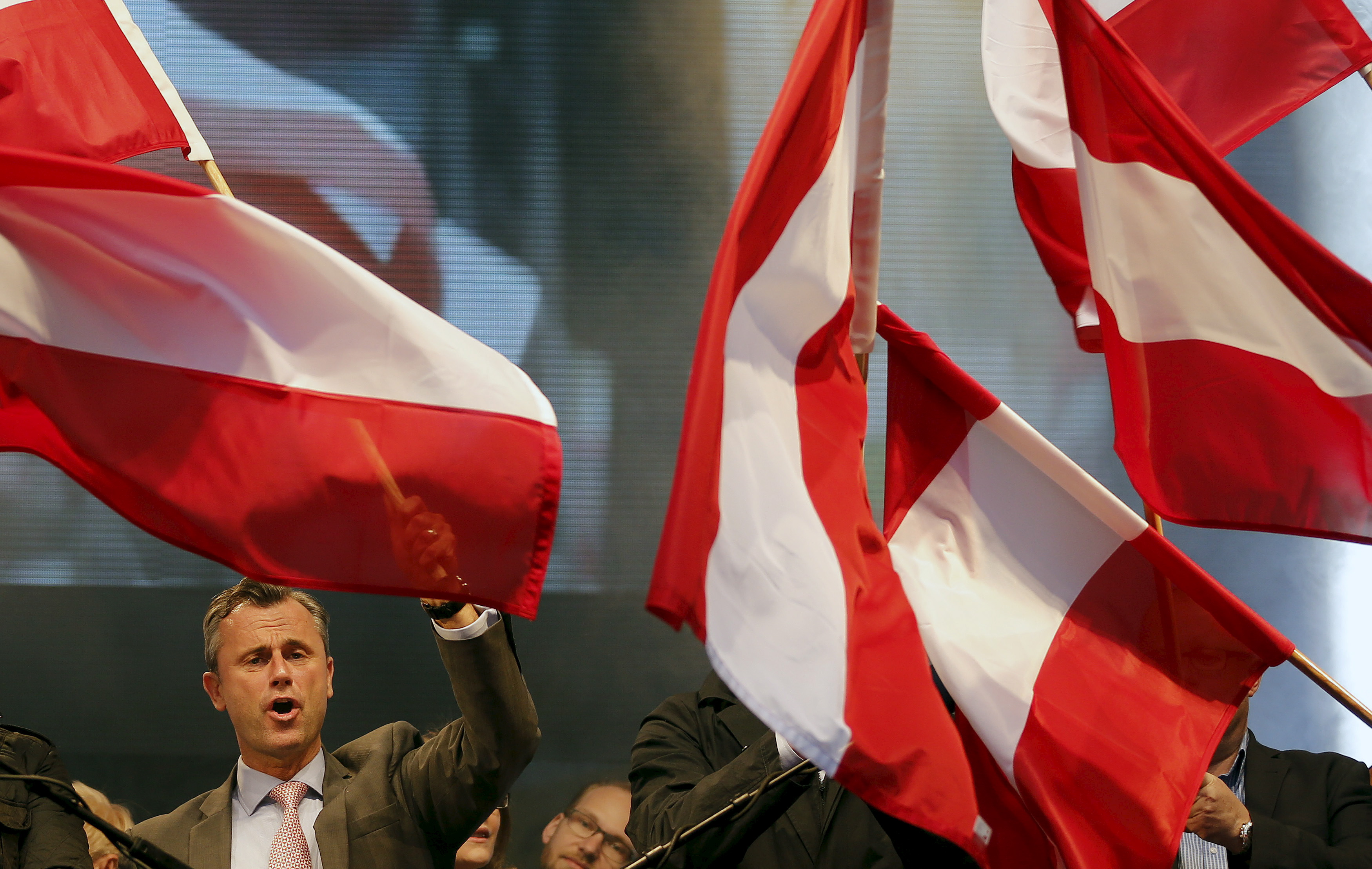How Europe succumbed to political insurgents
Austria becomes the latest European country to fall to extremists from the left and the right


Austria shocked the world last weekend when its populist, anti-immigrant Freedom Party came in first in its presidential elections. The Greens party came in second, and so candidates of both parties will now advance to a runoff. It's the first time in post-war Austria that both of the traditional centrist parties were shut out of the presidential runoff. Even though the presidency is largely a symbolic office in Austria, this was a political earthquake.
But for anyone who has been watching Europe over the past few years, it really shouldn't have come as a surprise. Like many populist parties in Europe, the Freedom Party combines what would be thought of in the United States as "right-wing" stances on immigration and crime with "left-wing" stances on the welfare state and trade. This has proven a potent combination in Europe, with populist, anti-immigrant, Europskeptic parties, like France's National Front, Italy's Lega Nord, and Germany's National Democratic Party on the rise. As for the Greens, they too have precedent in anti-establishment leftist movements like Podemos in Spain or Syriza in Greece.
Americans might see these trends and think: Donald Trump and Bernie Sanders! They'd have a point, but there are some key differences.
The Week
Escape your echo chamber. Get the facts behind the news, plus analysis from multiple perspectives.

Sign up for The Week's Free Newsletters
From our morning news briefing to a weekly Good News Newsletter, get the best of The Week delivered directly to your inbox.
From our morning news briefing to a weekly Good News Newsletter, get the best of The Week delivered directly to your inbox.
First is that anti-establishment impulses are even stronger in Europe than they are in the U.S. The migrant crisis has been a boon for Europe's populist parties. So have the Paris and Brussels attacks, some of whose perpetrators snuck into Europe amidst the waves of migrants, and the Cologne assaults. But there are deeper scars from the drama of the euro crisis, and the ensuing austerity, that empower leftist populists as well as rightists.
Another key different between European and American populism is how the systems incorporate extremism. Politics in the U.S. are often described as "polarized," and that is true enough, but they are polarized between two main parties whose center of gravity remains at the center. Even if the GOP nominates Trump, he will lose in 45 states and the next time around, Republicans will probably nominate a boring conservative. And even if Trump were somehow to become president, Sanders won't be the Democratic majority leader in the Senate — nor would he have that much power if he were. The virtue of a bipartisan system is that it gives extremists a voice, while keeping them within a generally centrist system.
In Europe's multiparty democracy, however, it's possible for extremist parties to do their own thing and reap success at the polls. Political shifts happen more often. The Whigs used to be one of Britain's two political powers, until the tiny Labour Party suddenly turned into a juggernaut and eclipsed them. Multiparty democracies tend to work around coalition politics, but Europe's politics are such that those parties often can't or won't join a coalition. Germany's Social Democratic Party has said that it won't be in coalition with the Left Party. France's Republican Party is still officially committed to a "firewall" against the National Front.
Welcome to the future of European politics: increasingly polarized, increasingly rancorous, increasingly dominated by anger and rancor.
A free daily email with the biggest news stories of the day – and the best features from TheWeek.com
Pascal-Emmanuel Gobry is a writer and fellow at the Ethics and Public Policy Center. His writing has appeared at Forbes, The Atlantic, First Things, Commentary Magazine, The Daily Beast, The Federalist, Quartz, and other places. He lives in Paris with his beloved wife and daughter.
-
 Panama and Canada are caught in a dispute over a copper mine
Panama and Canada are caught in a dispute over a copper mineIn the Spotlight Panama is set to make a final decision on the mine this summer
-
 ‘Dark woke’: what it means and how it might help Democrats
‘Dark woke’: what it means and how it might help DemocratsThe Explainer Respectability be damned, some Democrats are embracing crasser rhetoric
-
 Book reviews: ‘American Reich: A Murder in Orange County; Neo-Nazis; and a New Age of Hate’ and ‘Winter: The Story of a Season’
Book reviews: ‘American Reich: A Murder in Orange County; Neo-Nazis; and a New Age of Hate’ and ‘Winter: The Story of a Season’Feature A look at a neo-Nazi murder in California and how winter shaped a Scottish writer
-
 Panama and Canada are caught in a dispute over a copper mine
Panama and Canada are caught in a dispute over a copper mineIn the Spotlight Panama is set to make a final decision on the mine this summer
-
 Why Greenland’s natural resources are nearly impossible to mine
Why Greenland’s natural resources are nearly impossible to mineThe Explainer The country’s natural landscape makes the task extremely difficult
-
 Iran cuts internet as protests escalate
Iran cuts internet as protests escalateSpeed Reada Government buildings across the country have been set on fire
-
 US nabs ‘shadow’ tanker claimed by Russia
US nabs ‘shadow’ tanker claimed by RussiaSpeed Read The ship was one of two vessels seized by the US military
-
 How Bulgaria’s government fell amid mass protests
How Bulgaria’s government fell amid mass protestsThe Explainer The country’s prime minister resigned as part of the fallout
-
 Femicide: Italy’s newest crime
Femicide: Italy’s newest crimeThe Explainer Landmark law to criminalise murder of a woman as an ‘act of hatred’ or ‘subjugation’ but critics say Italy is still deeply patriarchal
-
 Brazil’s Bolsonaro behind bars after appeals run out
Brazil’s Bolsonaro behind bars after appeals run outSpeed Read He will serve 27 years in prison
-
 Americans traveling abroad face renewed criticism in the Trump era
Americans traveling abroad face renewed criticism in the Trump eraThe Explainer Some of Trump’s behavior has Americans being questioned
